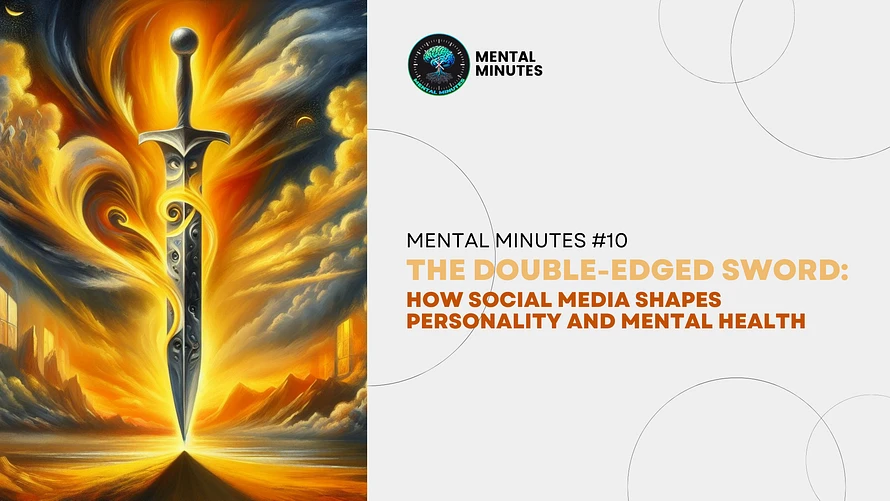The Double-Edged Sword: How Social Media Shapes Personality and Mental Health
Once upon a time, in the digital realm of social media, a vast array of personalities intermingled, shaping and being shaped by their online experiences. But behind the colorful avatars and carefully crafted posts lay a complex landscape where mental health struggles often lurk in the shadows.
In recent years, the impact of social media on mental health has garnered increasing attention from researchers and psychologists alike. Let's delve into the data and stories that illustrate this intricate relationship.
The Persona Puzzle
Imagine Sarah, a young professional who spends hours scrolling through her Instagram feed, admiring the seemingly perfect lives of influencers. Each meticulously curated post adds a layer to her perception of what her life should be like. But as she compares herself to these digital personas, feelings of inadequacy and self-doubt start to seep in.
According to a study by the Royal Society for Public Health, Instagram ranked as the worst social media platform for mental health and wellbeing, with feelings of anxiety, depression, loneliness, and body image issues being commonly reported among users. The constant barrage of idealized images can distort reality and fuel unrealistic expectations.
The Validation Trap
Now, let's meet David, a college student who craves validation through likes and comments on his Facebook posts. Each notification triggers a dopamine rush, reinforcing his need for external approval. But when the likes dwindle or negative comments emerge, so does his sense of self-worth.
Research published in the Journal of Social and Clinical Psychology revealed a significant link between social media use and feelings of loneliness and depression, particularly among young adults. The constant need for validation can lead to a cycle of dependency on external affirmation, leaving individuals vulnerable to fluctuations in their online popularity.
The Comparison Conundrum
Enter Emily, a high school student who feels the pressure to measure up to her peers' highlight reels on Snapchat. As she scrolls through images of parties and vacations, she can't help but compare her own life to theirs. With each comparison, her self-esteem takes a hit, amplifying her feelings of inadequacy.
A survey conducted by Pew Research Center found that 45% of teens feel pressured to only post content that makes them look good to others. The fear of missing out (FOMO) and the constant urge to present an idealized version of oneself can contribute to increased stress and anxiety among young social media users.
The Escape Illusion
Lastly, let's consider James, who seeks solace from real-world stressors by immersing himself in the world of Twitter. The anonymity and detachment offered by social media provide a temporary escape from his troubles. But as he delves deeper into the echo chambers of his chosen online communities, he becomes ensnared in a web of polarizing viewpoints and misinformation.
Studies have shown a correlation between excessive social media use and decreased subjective wellbeing, as well as a heightened risk of addiction and compulsive behavior. The allure of endless scrolling and the illusion of connectivity can mask underlying mental health issues, trapping individuals in a cycle of avoidance and emotional detachment.
Conclusion: Navigating the Digital Landscape
As we navigate the labyrinth of social media, it's crucial to recognize the impact it can have on our mental health and wellbeing. While these platforms offer unprecedented opportunities for connection and self-expression, they also pose significant risks if left unchecked.
By fostering digital literacy and promoting healthy online habits, we can empower individuals to navigate the digital landscape with resilience and self-awareness. Whether it's limiting screen time, curating a positive feed, or seeking support when needed, every action taken towards mindful social media use contributes to a healthier online ecosystem for all.
Remember, behind every profile picture lies a multifaceted human experience, worthy of compassion and understanding. Let's strive to cultivate authenticity, empathy, and balance in our digital interactions, forging a path towards a more harmonious relationship between social media and mental health.
Sources:
Royal Society for Public Health: #StatusOfMind Report
Journal of Social and Clinical Psychology: No More FOMO: Limiting Social Media Decreases Loneliness and Depression
Pew Research Center: Teens, Social Media & Technology 2018
Harvard Business Review: Social Media Is Harming the Minds of Our Youth
National Institutes of Health: The Role of Social Media in Mental Health
